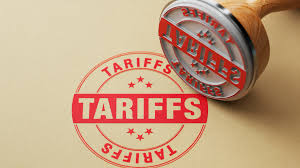Trade negotiations between the European Union and the United States are gaining traction, with both sides expressing cautious optimism after a constructive meeting in Paris on Wednesday.
EU Trade Commissioner Maros Sefcovic and U.S. Trade Representative Jamieson Greer described the talks as productive, signaling progress toward a potential agreement to avert further escalation of tariffs.
However, the doubling of U.S. tariffs on steel and aluminum imports, effective today, has cast a shadow over the discussions, with the EU expressing regret over the move.
The tariff hike, signed into effect by President Donald Trump late Tuesday, raises duties on steel and aluminum imports to 50% from the previous 25% rate set in March. The increase, effective at 12:01 a.m. (0401 GMT), spares only the United Kingdom, which secured a preliminary trade framework with the U.S. during a 90-day tariff pause.
The move has rattled global metals markets, with aluminum price premiums doubling this year, exacerbating supply chain pressures.
Sefcovic emphasized the EU’s shared concerns with the U.S. over global steel overcapacity, urging collaboration rather than unilateral measures. “We are advancing in the right direction, at pace,” he told reporters, noting that technical talks are ongoing in Washington, with high-level discussions to follow.
Greer echoed the sentiment, stating that the talks reflect “a willingness by the EU to work with us to find a concrete way forward to achieve reciprocal trade.”
The White House is pressing trading partners to submit “best offers” by today to avoid broader “reciprocal” tariffs set to take effect on July 8. These proposed levies, paused on April 9, could significantly raise duties on a wide range of imports unless agreements are reached.
While the UK has secured a preliminary deal, other nations, including the EU, are racing against the clock. A source familiar with the negotiations revealed that the EU has not yet received a formal letter from Washington outlining expectations for tariff proposals, unlike other trading partners.
The tariff uncertainty is wreaking havoc on global businesses. French spirits group Remy Cointreau abandoned its 2030 sales growth targets, citing U.S. tariffs and economic uncertainty. Austrian steelmaker Voestalpine warned of earnings impacts, while Germany’s WSM trade group, representing 5,000 metal processing firms, expressed alarm over the tariffs’ effects. “Nobody has the margins to absorb these bottomless tariffs,” said WSM Managing Director Christian Vietmeyer, urging the EU to resolve the conflict swiftly.
Compounding global trade concerns, China’s restrictions on critical mineral exports are disrupting supply chains. European auto parts plants have suspended production, and German automaker BMW reported shortages of rare earths affecting its supplier network.
Meanwhile, Trump’s comments on Wednesday labeling Chinese President Xi Jinping as “extremely hard to make a deal with” underscored ongoing U.S.-China trade frictions, dampening hopes for a near-term resolution.
Despite the challenges, financial markets have remained resilient, with investors betting that the current tariffs may be temporary. British Prime Minister Keir Starmer expressed confidence that U.S. tariffs on UK steel could drop to zero within weeks, signaling potential for further breakthroughs.
As the July 8 deadline looms, the EU and U.S. continue to navigate a delicate path toward a trade deal that could stabilize markets and prevent further economic fallout.
WHAT YOU SHOULD KNOW
The U.S.-EU trade talks are progressing constructively, with both sides optimistic about reaching a reciprocal trade agreement before the July 8 deadline for broader U.S. tariffs. However, the doubling of U.S. steel and aluminum tariffs to 50%, effective June 4, 2025, has strained negotiations and disrupted global markets, with the EU urging cooperation on shared challenges like steel overcapacity.
The tariff hike, sparing only the UK, is creating significant uncertainty for global businesses, exemplified by production halts in European auto parts plants and warnings from companies like BMW and Remy Cointreau, highlighting the urgent need for a resolution to stabilize trade and supply chains.












